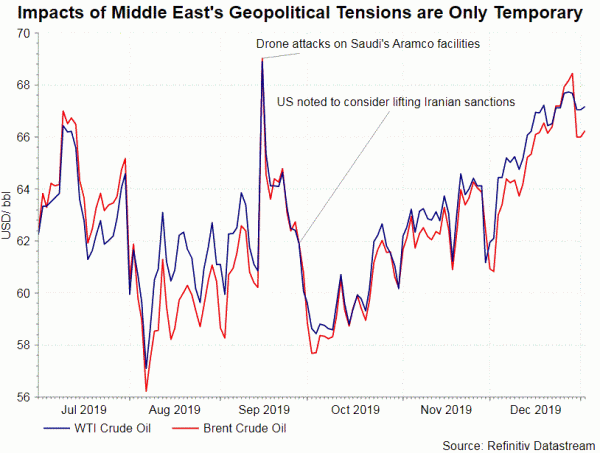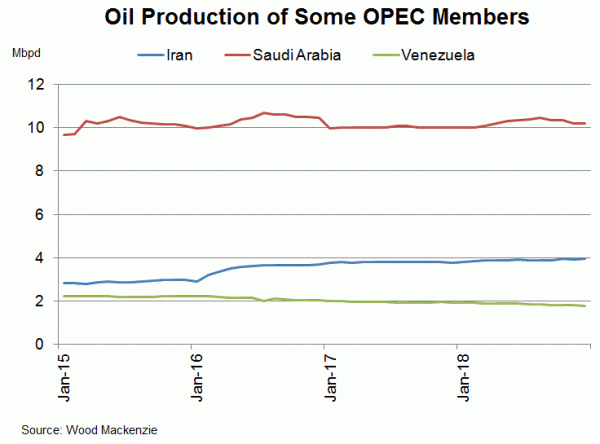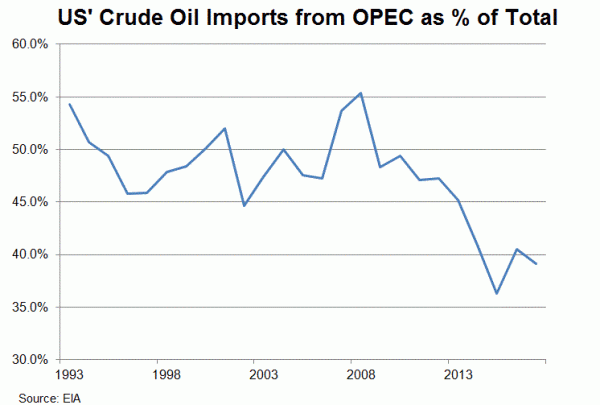Re-escalation of geopolitical tensions in Iran lifted oil prices. The front-month WTI crude oil contract, rallying more than +3%, spiked to 63.4 at one point. The corresponding Brent contract, gaining about +3.5%, jumped to a 7- month high of 69.16 earlier today. It was reported that a top Iranian general was killed in a US airstrike. We expect the price strength would be short-lived.
 Crude oil prices had a roller-coaster ride last year. Beginning the year at low levels (WTI: US$46/bbl; Brent: US$54/bbl), both oil benchmarks rebounded on bargain hunting, US’ sanction on Venezuela and OPEC’s extension of output cut. US’ announcement to lift sanctions on Iran in April resulted in a peak (WTI: US$66.3/bbl: Brent: US$ 75.6/bbl) and subsequent correction in oil prices. The selloff was also reinforced by renewed concerns over global economic slowdown and standoff of US-china trade war. Prices has since then gyrated within a broad range.
Crude oil prices had a roller-coaster ride last year. Beginning the year at low levels (WTI: US$46/bbl; Brent: US$54/bbl), both oil benchmarks rebounded on bargain hunting, US’ sanction on Venezuela and OPEC’s extension of output cut. US’ announcement to lift sanctions on Iran in April resulted in a peak (WTI: US$66.3/bbl: Brent: US$ 75.6/bbl) and subsequent correction in oil prices. The selloff was also reinforced by renewed concerns over global economic slowdown and standoff of US-china trade war. Prices has since then gyrated within a broad range.
Geopolitical tensions in the Middle East cause volatility in oil prices. However, the impacts have turned less prominent over the past decade. OPEC used to be the setter of the world’s oil prices, as the cartel controls over 40% of the world’s crude oil production. Things have been changed since the US accelerates its own shale gas production. Indeed, US’ imports from OPEC have been in a downtrend over the past years.This has markedly reduced the reliance on OPEC supply and diminished the influence of the cartel.
Recall the drone attacks on Saudi Arabia’s Aramco oil facility in September 2019, oil prices spiked but only briefly. Meanwhile, the one-day rally of 15 percentage points might not repeat this time. While both are OPEC members, global influence in terms of oil output diverges. For instance, Saudi Arabia is the largest producer in the cartel with an output of 9.8M bpd in October 2019. This is compared with Iran’s production of 2.1M bpd. Meanwhile, during the years of sanctions imposed by the US and its western counterparts in the past decade, most of the supply from Iran has been substituted. As such, the impact of supply disruption would be limited.

